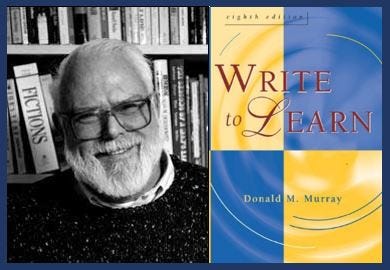Hey, we’re now in the third month (August 2021) of these 4 Topics Plus newsletters - still going strong with in-depth looks at four main topics, namely, Writing, Art, Music, and Faith. It’s time once again to explore the world of Writing. We’ll start out by questioning the wisdom of that old adage, “Write what you know.”

“Write What You Know”
Following one of the first writers’ conference lectures I ever attended, I left the room thrilled and wholly satisfied that I had just been given the ultimate key to successful creative writing - simply, “Write what you know.” I pledged to myself, from that point on, those four succinct words would guide all the creative writing I would ever undertake in my life.
Just look at John Grisham for example. He’s written some thirty-seven novels (over 300 million copies sold), most of them bestsellers about law and politics. And he’s a lawyer and a politician by profession, so that obviously means he writes about what he knows! Who could ever possibly doubt or argue that’s a foolproof, winning formula?!
And then look at Tom Clancy, who has written nineteen novels (100 million copies sold), seventeen of which were bestsellers about spies and the military. Clancy was an insurance agent who, … Wait a second … Tom Clancy’s eyesight that was so bad that it even prevented him from serving in his college’s Army ROTC program. What did this severely myopic insurance agent personally know about the spies and the military he wrote about in so much accurate detail? Hmmm …
Well, maybe Tom Clancy wasn’t a good example of writing what you know, but what about Harry Potter author, J.K. Rowling, whose bestselling books have sold more than 500 million copies? She had to know much about wizards, the game of quidditch, or Hogwarts School of Witchcraft and Wizardry to … Oh, never mind …
“Write about what you know” is the most stupid thing I’ve heard ... It’s the reverse of firing the imagination and potential of writers.”
Kazuo Ishiguro, Author
I can’t remember the name of that lecturer who taught, with all solemnity, that write what you know was the best writing policy - and for good reason. Those four words of advice (in that particular order, anyway) turned out to be pure baloney.
Before arriving at this conclusion, however, I heard another author speak of his experience with approaching a short story idea. He discussed all the preparatory work and research required to write about an emergency surgery situation - a world he knew nothing about. He said he needed to learn the vocabulary and procedures of an operating room to make his story believable. When I heard this, I thought, “What are you doing? Why are you writing about something so unfamiliar that you need to do all this study and research? You have no business there. Write what you know!!” What I didn’t understand or appreciate at the time, is that there is much greater value to switching those four words around - Know what you write!
In an earlier post, I referred to a mentor’s words of writing wisdom. I never met or spoke with the late Pulitzer Prize-winning Professor Donald M. Murray,1 but his three-word book title alone completely changed my erroneous thoughts about writing what you know. Write to Learn, was his counterpoint. Professor Murray knew this process and observed its truth that, “Writers write to learn, to explore, to discover, to hear themselves saying what they do not expect to say.” To be most effective, a writer needs to know the subject, even if it’s unfamiliar at first. Study and research and learning is what it takes sometimes to produce a worthwhile story.
“Mama, I Just Killed a Man …”
Those were the mournful words sung by the late composer and singer Freddie Mercury. There has been much speculation about the real, but veiled, meaning of those seemingly autobiographical lyrics. Surely, they must be a metaphor. There’s no way Freddie Mercury would ever have “put a gun against his head, pulled my trigger, now he’s dead,”2 as the song continues. Would he?
Just for fun one day, the more evil and impish side of my brain began pondering whether these lyrics were actually a confession, rather than an allegory. If so, was it even remotely possible for Freddie to have killed someone like that at close range? Was there a space or reason in his life for such a possibility? Was there (as real-life crime stories would dictate) a motive, means, and opportunity? If there was, I had a potentially sound foundation for an interesting fiction story!
I knew that Freddie was from England, and that handguns were a rare commodity in the British Isles. Even local police officers did not carry firearms in those days. The odds seemed unlikely that Freddie Mercury could have possessed a handgun, let alone used it to kill someone, and then have gotten away with it. That initial thought alone was enough to squelch my story prospects. But I kept at it, doing a little more pondering, a little more research, a little more learning. It turned out that Freddie was not a British native after all. He was born and raised in Stone Town, Zanzibar - more than 11,000 miles away from England, off Africa’s eastern coastline. Was it possible that such a killing could have taken place in Stone Town, where handguns might be more freely available?
Like that writer who needed to research medical terminology and surgical procedures, I soon discovered there was much about Freddie and his true homeland that I did not know. I needed to Write to Learn. I needed to know what I was writing about. I had to study maps and photos. I had to read histories and biographies. I created a huge map of Stone Town on a large piece of poster board. Although I’ve never been there, I came to know that city’s noteworthy buildings, its streets, and its alleyways, as they would have appeared in the mid-1960s. I came to know Stone Town almost as well as the city I currently live in. The result of all this learning? I was able to pinpoint a unique, four-day window of trigger-pulling opportunity during Freddie’s teen years. Those four days also provided a fictional, but historically plausible, motive and means for him to have “killed a man” (and for good reason!). A previously unthinkable short story was born.3
My fictional tale about a deadly encounter in Zanzibar was based on a real time and place, real people, and real circumstances - speculative history, it might be called. Especially in the age of the internet, there were no excuses for me to not thoroughly research the subject matter and find needed facts.
Worldbuilding
Sometimes though, fiction is based on complete fantasy, requiring writers to do some worldbuilding - creating imaginary, fabricated settings for their stories. Even so, to be effective, those settings need to be plausible. Some writers even draw out maps of the places they invent, creating believable worlds where characters act out their lives. If the sun sets in the west, the characters need to be facing west to see the setting sun. If the church is located three blocks away from the office building in the first chapter, there can’t be five miles between them in chapter seven. Even if the work is pure fantasy, the writer needs to know of what they write. If captured thoroughly and properly, these worlds will be effectively transmitted to the readers’ minds.
When I first saw the movie Holes, it perfectly fit the imagery I had in my mind, based on reading the book by Louis Sachar. Similarly, I only read the first book in the Harry Potter series, but when I saw the first film, I was stunned by how much the scenery and buildings looked just as I had imagined them. I credit the authors’ success to knowing what they wrote about, even if they wrote works of fanciful fiction.
Long ago, as I considered going to college, a dear friend and educator, Nancy Piedmonte,4 once told me, “The biggest and best thing you learn when you go to school is the discovery of how much you don’t know.” The same could be said of writing, where in order to be most effective, you’re forced to abandon ignorance, and to know what you write.
Here’s a >>LINK<< to a beautiful eulogy for Donald Murray, citing his contributions to the world of writing and successfully teaching students over many years.
From the famed tune, “Bohemian Rhapsody” by Queen.


